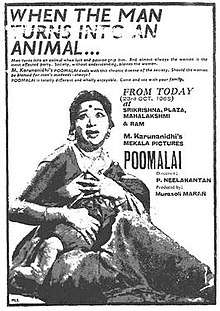Poomalai
Poomalai (transl. Garland of Flowers) is 1965 Indian Tamil-language woman's film, directed by P. Neelakantan and written by M. Karunanidhi. The film was produced by Murasoli Maran under Karunanidhi's production company Meghala Pictures, which also distributed the film. It stars S. S. Rajendran, C. R. Vijayakumari and Anjali Devi, with S. A. Ashokan, Nagesh and Manorama in supporting roles. The film focuses on the title character, a happy-go-lucky girl whose life changes for the worse when she is raped. It was released on 23 October 1965.
| Poomalai | |
|---|---|
 Theatrical release poster | |
| Directed by | P. Neelakantan |
| Produced by | Murasoli Maran |
| Written by | M. Karunanidhi |
| Starring | S. S. Rajendran C. R. Vijayakumari Anjali Devi |
| Music by | R. Sudharsanam |
| Cinematography | Amirtham |
| Edited by | R. Devarajan |
Production company | Meghala Pictures |
| Distributed by | Meghala Pictures |
Release date |
|
Running time | 150 minutes |
| Country | India |
| Language | Tamil |
Plot
Poomalai is a happy-go-lucky girl living with her father and elder brother. Her life changes for the worse when she is raped.
Cast
- S. S. Rajendran as Sundaram[1]
- C. R. Vijayakumari as Poomalai[2]
- Anjali Devi as Maragatham[1]
- Nagesh as Chittu[1]
- Manorama as Myna[3]
- S. A. Ashokan as Anand[3]
- Rajasree as Nalina[3]
- T. S. Muthaiah as Poomalai and Anand's father[3]
- V. R. Thilakam as Leela[3]
- M. S. Bhakkyam as Subbhamma[3]
- Radhabhai
Production
Poomalai was directed by P. Neelakantan, written by M. Karunanidhi and produced by Murasoli Maran under Meghala Pictures. Art direction was handled by B. Nagarajan, cinematography by Amirtham and editing by R. Devarajan.[3] Karunanidhi appeared as himself onscreen, giving the film's opening monologue.[4] Although Karunanidhi was the owner of Meghala Pictures,[5] he was not credited as the film's producer.[3]
Themes
Historian R. Kannan said that Karunanidhi used to ingeniously weave contemporary politics into the dialogues he wrote for films, and named a dialogue in Poomalai where the sister speaks highly of her brother and threatens to shoot anyone speaking ill of him as an example.[6]
Soundtrack
The soundtrack was composed by R. Sudharsanam.[7] The lyrics were written by Mayavanathan, Seetharaman, Kavi Rajagopal, Kumaradevan and M. Karunanidhi.[8]
| No. | Songs | Lyricist | Singers | Length |
|---|---|---|---|---|
| 1 | Badhamgeer....Rani Diamond | Seetharaman | S. C. Krishnan, L. R. Eswari | 03:53 |
| 2 | Kannam Kannam | M. Karunanidhi | L. R. Eswari | 03:48 |
| 3 | Kattai Viral | Kumaradevan | P. Susheela | 04:19 |
| 4 | Penne Un Gathi | Mayavanathan | C. S. Jayaraman | 03:09 |
| 8 | Ulagame Ethirthaalum | Mayavanathan | C. S. Jayaraman | 02:52 |
| 7 | Un Ennathai | Kavi Rajagopal | T. M. Soundararajan P. Susheela | 03:45 |
Release and reception
Poomalai was released on 23 October 1965,[9] during that year's Diwali day.[10] Meghala Pictures distributed the film themselves in Madras, while other distributors did so in other districts of Tamil Nadu.[11] The Indian Express wrote on 30 October, "An otherwise loose screenplay is propped up by the beautiful dialogues by M. Karunanidhi and fine portrayals by Rajendran (the hero), R. Vijayakumari (the heroine), veteran Anjali Devi (the widowed sister of the hero) and comedian Nagesh. Neelakantan's direction is nothing to write home about, but with the material at his disposal, he has made it into a good tear-jerker, appealing to family audiences, especially women."[1] Writing in Sport and Pastime, T. M. Ramachandran lauded the performances of Rajendran, Vijayakumari and appreciated the performances of Nagesh, Anjali Devi, Manorama, Ravi, Asokan, Muthiah and Rajsri. He added that Karunanidhi's screenplay and dialogues were the film's "saving graces", but criticised Neelakantan's direction for succumbing to "trivialities and box-office considerations".[12] According to historian Vamanan, the film landed Karunanidhi in deep debt.[13]
References
- "Poomalai is a good family entertainer". The Indian Express. 30 October 1965. p. 3.
- Sankaran, Keerthana (8 August 2018). "How Kalaignar's movie scripts show a subtle blend of Dravidian politics, mythology and women-centric stories". The New Indian Express. Archived from the original on 6 January 2019. Retrieved 5 January 2019.
- Poomalai (motion picture) (in Tamil). Meghala Pictures. 1965. Opening credits, from 0:00 to 4:12.
- Swathi (4 September 2018). "கலைஞர் என்னும் கலைஞன் - 17 : பூமாலை" [Kalaignar alias the artist – 17: Poomalai]. Valai Tamil. Archived from the original on 21 February 2019. Retrieved 21 February 2019.
- Rathnagiri, R. (2007). Time capsule of Kalaignar. Dravida Munnetra Kazhagam. p. 63.
- Kannan, R. (2010). Anna: The Life and Times of C.N. Annadurai. New Delhi: Penguin Books. p. 197. ISBN 978-0-670-08328-2.
- "Poomaalai". JioSaavn. Archived from the original on 10 January 2019. Retrieved 10 January 2019.
- "Poomalai | Tamil Movie Audio Jukebox". YouTube. Saregama. 4 March 2015. Retrieved 5 January 2019.
- "திரையுலகில் கலைஞர்" [Artist in the world of films]. Dinamalar (in Tamil). 27 July 2018. Archived from the original on 6 January 2019. Retrieved 5 January 2019.
- Dheenadhayalan, P. (3 March 2016). "அஞ்சலி தேவி: 5. சத்ய சாயீ!". Dinamani (in Tamil). Archived from the original on 10 January 2019. Retrieved 10 January 2019.
- "Poomalai". The Indian Express. 23 October 1965. p. 3.
- Ramachandran, T. M. (4 December 1965). "Poomalai". Sport and Pastime. Vol. 19. p. 51.
- Vamanan (31 August 2018). "Rare scenes: When party lines blurred for Karuna". The Times of India. Archived from the original on 10 January 2019. Retrieved 10 January 2019.